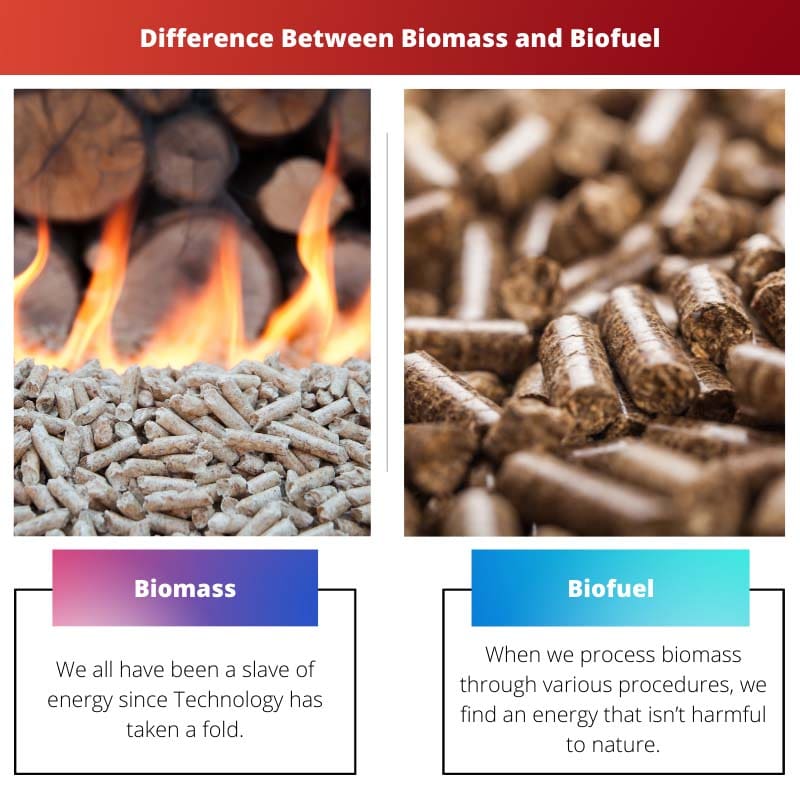The world is witnessing an evolution. From camels and horses for means of transportation to vehicles and aeroplanes. The scenario had transformed in a whole new way.
So the resources and fuels are being used up to a greater extent. However, biofuel and biomass are some eco-friendly items for the environment.
Key Takeaways
- Biomass refers to organic materials like wood, crop, and animal waste used for energy production, while biofuels refer to a liquid or gaseous fuels derived from biomass.
- Biomass energy production is a more traditional method that involves burning organic matter directly to generate heat, while biofuels are produced through advanced conversion technologies like fermentation and gasification.
- Biomass has a higher carbon footprint than biofuels, which produce fewer greenhouse gases and are considered a more sustainable alternative to fossil fuels.
Biomass vs Biofuel
An organic substance from plants or animals utilized as an energy source is biomass—for example, waste, crops, and timber. A specific kind of fuel made from biomass is known as biofuel. For example, biodiesel is produced from vegetable oils and animal fats.

Biomass, as the name says, is the mass that can generate fuel through biological processes.
Biodegradable substances like peels, plants, or plant-derived substances, including vegetable oils, leftovers, pulp wastes, manure, grains, and animal-based oils. Biomass is a non-fossil item, a renewable source contributing to eco-friendly materials.
Biofuel is the derivate of biological materials. These energy sources can be in any of the three possible states: Solids, liquids, and gases.
Also, it can be said as fuels can be generated through biomass while undergoing biological processes—biofuels like Ethanol, Butanol. Methanol, Bio-diesel are some examples.
Comparison Table
| Parameters of Comparison | Biomass | Biofuel |
|---|---|---|
| Definition | Biomass is a collective term for substances that can be decomposed or known as non-fossil materials. | Biofuel is the derivate of biological materials. |
| Hierarchy | Biomass is the basis of biofuel since it’s the prime material to generate fuel. | Biofuel is a type of end material used to run vehicles or machines. |
| Examples | Some significant products are plant residues, animal manure, peel-offs, biodegradable wastes, etc. | Major end products generated are methanol, biodiesel, butanol, ethanol, and bio-oil. |
| Type of substance | Biomass goes under biological processes, which act as a raw substance. | Biofuel is used to run machines or serve different purposes. Also, these are not raw items. |
| Energy-based | Biomass is used for cooking, lighting producing electricity, and heating. | Biofuel is used in vehicles that are eco-friendly and many more. |
What is Biomass?
We all have been a slave of energy since Technology has taken a fold. We need energy for machines, running vehicles, and even inside houses.
Regarding energy sources, these can be categorized into two parts. The first is a non-renewable source, and the second is a renewable energy source.
Non-renewable comprise sources that come from sources that exhaust. Also, these generate a considerable amount of pollution and can harm nature.
Moreover, it’s finite sources; according to analysts, we have used more than half of the resources. While renewable energy, like Biomass, is an eco-friendly energy source that mostly comes from animals and plants.
Biomass can be termed as the sources including plant waste, animal manure, wastes from pulp, urban wood waste, grains, and animal-based oils, which can generate energy that doesn’t pollute the air. Moreover, it’s a source that lasts indefinitely.
Through biological processes, energy can be derived, which can be further used for work. These are all non-fossil fuels that contain intrinsic chemical energy composition. The most significant sources can be agricultural lands and forests, which are abundant in nature.

What is Biofuel?
When we process biomass through various procedures, we find an energy that isn’t harmful to nature. These energy sources are called biofuel. These are the derivates of biomass.
Biofuel is safe for nature and can be a better option for people to choose to conserve wildlife.
Biomass contains a chemical composition that can generate Power. This power runs various components, from running eco-friendly vehicles in cities to using this biofuel daily. It has a broader application and reasons to use it in this 21st century.
We all have been fighting against global warming and pollution levels. It’s a severe threat to humanity. Also, it poses threats to terrestrial and aquatic species. The pollution generated from fossil fuels affects the skin and animal life, resulting in mass death.
On the other hand, biofuel is the reverse of these threats. They are not only eco-friendly and good for nature but also are indefinite.
Exhaustible sources will be over someday, but as long as animals and plants exist, we have abundant biomass and, eventually, biofuel. Some examples of end-products are methanol, ethanol, butanol, bio-oil, and bio-diesel.

Main Differences Between Biomass and Biofuel
- Biomass is a collection of materials that undergo biological processes, while biofuel doesn’t go into the process since they are end-products.
- Biomass includes plant waste, animal manure, vegetable oil, and animal oil, all non-fossil materials, while biofuel is like methanol, ethanol, and butanol.
- Biomass is used for cooking and heating, while Biofuels run vehicles since biofuels are the end-products.
- Biomass is the basis of biofuel, while biofuel can be said as the child of biomass.
- Biomass is always raw, like plant residues, animal manure, peel-offs, biodegradable wastes, etc., while biofuels can be said to be cooked.

Last Updated : 11 June, 2023

Piyush Yadav has spent the past 25 years working as a physicist in the local community. He is a physicist passionate about making science more accessible to our readers. He holds a BSc in Natural Sciences and Post Graduate Diploma in Environmental Science. You can read more about him on his bio page.

The comparison between biomass and biofuel is elucidated in a manner that is both educational and engaging. Kudos to the author for presenting this complex topic with such clarity.
Absolutely, the comprehensive comparison and insightful explanations are truly praiseworthy. It’s a valuable contribution to understanding renewable energy sources.
This is a fascinating exploration of the evolution of energy sources and the advantages of biofuels and biomass. It’s a great reminder of the need to shift towards more eco-friendly options.
Absolutely, the potential of biofuels and biomass as sustainable energy sources cannot be overlooked. This article presents a compelling case for their use.
The emphasis on eco-friendly energy and the detailed comparison between biofuels and biomass are very enlightening. Well done!
The detailed explanation of biomass and biofuels is commendable. It’s time for a concerted effort to embrace renewable energy and this article serves as a compelling argument for it.
The urgency to transition towards renewable energy is unmistakable. This article makes a strong case for the adoption of biofuels and biomass as sustainable alternatives.
The shift towards biofuels and biomass is a necessity given the environmental challenges we face. This article provides valuable insights into the differences between the two energy sources.
Absolutely, the urgency to adopt more sustainable energy sources is evident. The explanations provided here are thought-provoking.
The concept of biofuels and biomass is presented in an engaging and informative manner. The article effectively conveys the need for transitioning towards sustainable energy sources.
Absolutely, the urgency of adopting renewable energy is conveyed eloquently in this article. A well-researched and insightful piece.
The focus on the sustainability of biofuels and biomass is essential. This piece effectively portrays the significance of eco-friendly energy sources in today’s context.
I couldn’t agree more. The emphasis on the environmental benefits of biofuels and biomass is compelling. An excellent read indeed.
While the article advocates for biofuels and biomass, it does a great job in highlighting their environmental benefits. The significance of renewable energy cannot be overstated.
Absolutely, renewable energy sources like biofuels and biomass are essential for mitigating climate change. The content of this article reinforces this point effectively.
The scientific exploration of biofuels and biomass is commendable. This article offers a thought-provoking look at the potential of sustainable energy sources.
Indeed, the depth of analysis and the emphasis on sustainability make this article a compelling read. It offers valuable insights into the future of energy production.
The article provides a compelling case for the adoption of biofuels and biomass as sustainable energy sources. The environmental benefits are clearly outlined and reinforce the importance of renewable energy.
I couldn’t agree more. The environmental and long-term benefits of biofuels and biomass make a strong case for transitioning towards renewable energy. An impressive piece of writing indeed.
This article is a comprehensive guide to understanding the concept of biofuels and biomass. The comparison table is particularly helpful in distinguishing between the two.
The in-depth explanations and examples provided in this article are incredibly useful. It’s an excellent resource for anyone seeking clarity on this topic.
Agreed, the detailed comparison table simplifies the differences and benefits of biofuels and biomass. A very informative read.